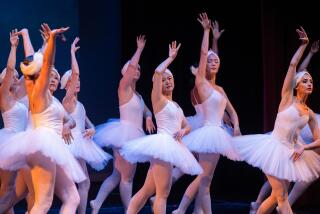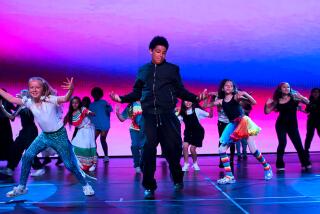Television Reviews : ‘Dance in America’ Spotlights Baryshnikov
It’s been years since the “Dance in America” series last presented either the New York City Ballet in works by George Balanchine or the Merce Cunningham ensemble in choreography by Cunningham.
So why is PBS ignoring these inimitable companies tonight and bringing us an hour of second-hand Balanchine and Cunningham dancing by American Ballet Theatre (8 p.m. on Channel 24, 9 p.m. on Channels 28 and 15; Saturday at 9 p.m. on Channel 50)?
The answer probably involves the availability (as dancer and host) of Mikhail Baryshnikov, who was briefly a member of City Ballet and, at 40, is still the biggest name in American dance. For star-struck viewers, that may be enough.
But watching ballet dancers alternately approximate and distort modern-dance technique in Cunningham’s “Duets” is pretty deadly--especially when most of their performances reek of prim duty or glum self-denial. You might tolerate this sort of thing in the theater as (if nothing else) proof of noble company intentions, but there’s no need to preserve it on videotape.
With Cunningham’s own dancers, and with a few members of the Ballet Theatre cast (notably Jennet Zerbe in the second duet, Wes Chapman and Christine Spizzo in the last), “Duets” plays as a breezy movement invention: a series of witty, intersecting essays in partnering relationships set to the rhythmic percussion of John Cage.
For once, TV director Thomas Grimm doesn’t dismember the dancing but reinforces the structure of the work through careful camera placement and editing. In Balanchine’s “La Sonnambula,” however, he is up to his old “Creole Giselle” tricks: shooting through foliage, minimizing the choreography by endless close-ups and more.
Set to Vittorio Rieti’s arrangements of music by Bellini, “La Sonnambula” represents Balanchine’s meditation on the darker themes of Romantic ballet. The plot (involving a poet’s choice between an earthly, worthless love and an unattainable, dangerous vision) is familiar yet strange, and the choreography rich in allusion.
The uneven performance finds Leslie Browne overwrought and unmusical as the Coquette, Alessandra Ferri oddly prosaic as the enigmatic Sleepwalker and Baryshnikov superficial as the doomed Poet: He dallies and dies as an uncomprehending innocent. Johan Renvall makes a deft Harlequin.
More to Read
The complete guide to home viewing
Get Screen Gab for everything about the TV shows and streaming movies everyone’s talking about.
You may occasionally receive promotional content from the Los Angeles Times.






